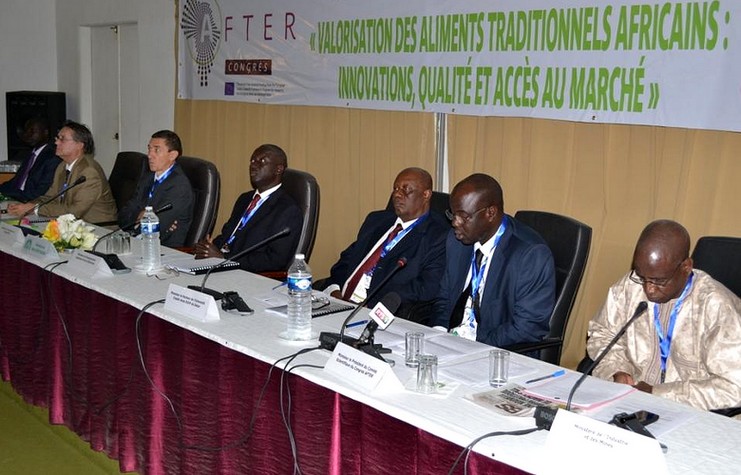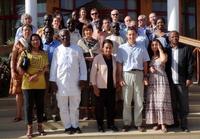 11-12 November 2014. Dakar, Senegal. The first international Congress on African traditional foods, gathered all the actors of the sector: researchers, companies, consumers, public organisations and politicians.
11-12 November 2014. Dakar, Senegal. The first international Congress on African traditional foods, gathered all the actors of the sector: researchers, companies, consumers, public organisations and politicians.More than a hundred of participants attended the 21 oral communications given over the two days of the Congress. During this international event, 6 different African countries (Benin, Senegal, Cameroun, Egypt, Madagascar and Ivory Coast) and 4 different European countries (France, Portugal,
Participants could also read the 26 scientific posters exhibited during the Congress, offering an even wider panel of countries represented.
In all, no less than 20 products were studied and of which the results of research were presented.
 |
| More than 10 African food companies (including the companies who participated to AFTER research via AAFEX) have presented their products in a dedicated exhibition space © AFTER |
United-Kingdom and Italy) were represented in the communications. A balance was found between communication on the results of AFTER research (60%) and communications on the results of other projects of research (40%). The proceedings of the Congress will soon be available.
Further references:
- Congress Program (187 Ko)
- Proceedings of the conference (available online 20/01/2015)
Related:
Le Quinoa, introduit en Europe il y a quelques années depuis l’Amérique du Sud, a connu un grand succès… Qu’en serait-il du « Kitoza » alors ? Ou d’autres produits traditionnels africains, tels l’Akpan, le Buy… ? Le projet AFTER s’intéresse à la valorisation de ces produits traditionnels africains :
• Mise au point des procédés d’amélioration (qualité, sécurité…) des produits traditionnels
• Développement de produits ainsi améliorés, innovants, compétitifs, et commercialisables
• Tests d’acceptabilité des produits (consommateurs, marchés…)
• Dissémination des résultats aux entreprises agroalimentaires
13-15 November 2014. Saly, Senegal. 29 representatives of the 16 partners of the project participated in the fourth and last annual meeting of the AFTER project.
Following the AFTER Congress, 1st Congress on traditional African Foods, the meeting brought together most of the AFTER partners: ACTIA, AAFEX, CIRAD, ENSAI, ESB (CBQF), ESP-UCAD, FAAU, NRC, NRI, Racines, SPES (FIAB), UAC and UT.
The main objectives of this meeting were to share the results obtained and to plan the drafting of the remaining deliverables within the deadlines. The dissemination strategy has also been discussed: the success of the 1st AFTER Congress inspired all the partners to maintain and enrich the dynamic launched, especially by guiding an AFTER network. AFTER is not longer simply a project but is now a concept to share.
Following the AFTER Congress, 1st Congress on traditional African Foods, the meeting brought together most of the AFTER partners: ACTIA, AAFEX, CIRAD, ENSAI, ESB (CBQF), ESP-UCAD, FAAU, NRC, NRI, Racines, SPES (FIAB), UAC and UT.
The main objectives of this meeting were to share the results obtained and to plan the drafting of the remaining deliverables within the deadlines. The dissemination strategy has also been discussed: the success of the 1st AFTER Congress inspired all the partners to maintain and enrich the dynamic launched, especially by guiding an AFTER network. AFTER is not longer simply a project but is now a concept to share.
Video:
Programme AFTER - Recherche: Adapter des produits traditionnels africains aux normes européennes
Le Quinoa, introduit en Europe il y a quelques années depuis l’Amérique du Sud, a connu un grand succès… Qu’en serait-il du « Kitoza » alors ? Ou d’autres produits traditionnels africains, tels l’Akpan, le Buy… ? Le projet AFTER s’intéresse à la valorisation de ces produits traditionnels africains :
• Mise au point des procédés d’amélioration (qualité, sécurité…) des produits traditionnels
• Développement de produits ainsi améliorés, innovants, compétitifs, et commercialisables
• Tests d’acceptabilité des produits (consommateurs, marchés…)
• Dissémination des résultats aux entreprises agroalimentaires



No comments:
Post a Comment